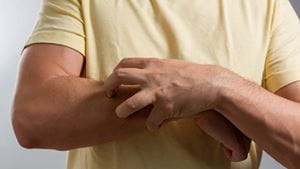
Mpox cases appear to be starting to spread again as the summer months approach - similar to 2022.
While mpox infections are very rarely fatal, symptoms can be quite painful and can lead to permanent scarring. Thankfully, health care providers have a number of treatments and methods of preventative medicine that are safe and effective.
Anja Bottler, MD, is an infectious disease specialist with Rochester Regional Health and details what a person should do if they test positive for mpox.
The telltale signs of mpox are a rash or cluster of sores that can be painful. These sores appear on or around an infected person’s genitals, hands, feet, or face, according to the CDC. They may eventually spread to other parts of the body.
Initially, the rash is flat, then becomes raised and filled with fluid. After a few days, the fluid-filled pustules harden and crust over before becoming scabs.
Individuals infected with the virus can also experience other symptoms such as:
“If you are experiencing any of the symptoms described above – especially if you have had contact with someone who has tested positive for mpox – isolate immediately and call your primary care provider,” Dr. Bottler said.
Suspected mpox cases are tested for the virus using a sample taken directly from a rash. The sample is run through a PCR test to match the viral DNA sequence.
Individuals who test positive are strongly encouraged to isolate at home to prevent the spread of the virus.
Those who live with other people should do their best to remain in a separate room and use separate dishes, cups, bedding, clothing, toiletries, and electronics. Any shared surfaces or objects should be cleaned with disinfectant as a precaution.
People isolating at home should also
“Isolating is challenging – not only logistically but mentally,” Dr. Bottler said. “When you are by yourself, try to do things you find relaxing – including exercise if you feel well enough. Staying connected to others will help to ease the difficulties that may come with isolation and gives you the opportunity to ask for help if you need it.”
Antiviral medications such as tecovirimat (TPOXX) may be prescribed to patients who have weakened immune systems or other reasons for increased risk of becoming severely ill.
Otherwise, most methods of treating mpox focus on symptom relief. Advice from the World Health Organization encourages people with mpox to take care of their rash while they are isolating. This means:
There is an mpox vaccine available that prevents infection. Eligible adults ages 18 and older will need to have two doses administered four weeks apart.
Most people with mpox will recover fully in 2-4 weeks and do not require medical treatment.
If you believe you may have exposed others to mpox, they should be told to contact their primary care provider.